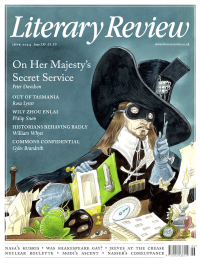Ada Wordsworth
Reading Livy in Lviv
The Tears and Smiles of Things: Stories, Sketches, Meditations
By Andriy Sodomora (Translated from Ukrainian by Roman Ivashkiv & Sabrina Jaszi)
Academic Studies Press 132pp £14.99
In 1962, the year of the Cuban Missile Crisis, 25-year-old Andriy Sodomora published his first translation, of Menander’s comedy Dyskolos. The Soviet Union imposed massive restrictions on the use of the Ukrainian language and Sodomora was uncertain whether to translate the ancient Greek work into Russian, the state language, or Ukrainian, his mother tongue. His hesitancy was not unfounded: in 1937 the Ukrainian translator Mykala Zerov had been murdered on Stalin’s orders. Ultimately, however, under the guidance of his lecturer at the Ivan Franko University of Lviv, Sodomora chose Ukrainian, thus beginning a career that would see him become Ukraine’s most prolific classical translator.
Translated by Roman Ivashkiv and Sabrina Jaszi, The Tears and Smiles of Things is a collection of Sodomora’s short stories, essays and musings, originally published in Ukrainian in two separate volumes. Here they are brought together in English for the first time. Set in both Lviv and his native village of Vyriv, the pieces combine Sodomora’s love of classical antiquity with his love of his Ukrainian home. The references scattered throughout the book range widely, from the classical era to early 20th-century Japanese poets, Federico García Lorca and Emily Dickinson.
Sodomora is obsessed with place. His descriptions open up Lviv as a city: a whole chapter is dedicated to the ‘dialect’ of its rain and another passage describes in minute detail a single shrivelled locust tree. His portrait of the ‘orchard-paradise’ of Vyriv is almost mystical. In one short story,

Sign Up to our newsletter
Receive free articles, highlights from the archive, news, details of prizes, and much more.@Lit_Review
Follow Literary Review on Twitter
Twitter Feed
The dropping of the atomic bomb on Hiroshima in August 1945 has long been regarded as a historical watershed – but did it mark the start of a new era or the culmination of longer-term trends?
Philip Snow examines the question.
Philip Snow - Death from the Clouds
Philip Snow: Death from the Clouds - Rain of Ruin: Tokyo, Hiroshima, and the Surrender of Japan by Richard Overy
literaryreview.co.uk
Coleridge was fifty-four lines into ‘Kubla Khan’ before a knock on the door disturbed him. He blamed his unfinished poem on ‘a person on business from Porlock’.
Who was this arch-interrupter? Joanna Kavenna goes looking for the person from Porlock.
Joanna Kavenna - Do Not Disturb
Joanna Kavenna: Do Not Disturb
literaryreview.co.uk
Russia’s recent efforts to destabilise the Baltic states have increased enthusiasm for the EU in these places. With Euroscepticism growing in countries like France and Germany, @owenmatth wonders whether Europe’s salvation will come from its periphery.
Owen Matthews - Sea of Troubles
Owen Matthews: Sea of Troubles - Baltic: The Future of Europe by Oliver Moody
literaryreview.co.uk